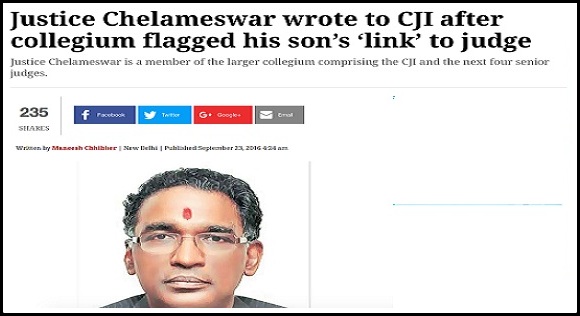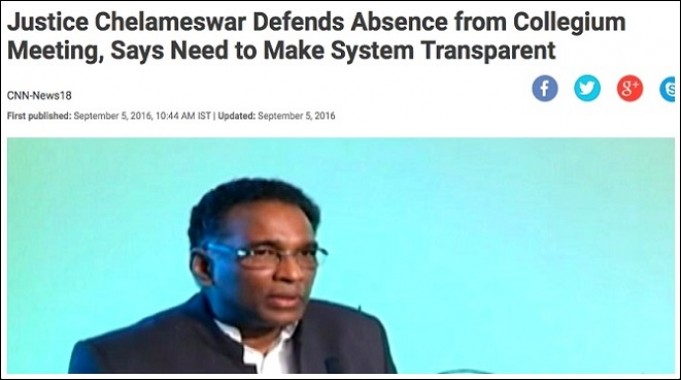The Express and Anon
One of the persistent problems with journalists working in English language newspapers is their over-reliance on anonymous sources. I’ve written about this issue of anonymous reporting earlier with regard to Outlook’s infamous hatchet job on Smriti Irani and the even more shameful reporting on Gopal Subramaniam’s appointment to the Supreme Court by multiple newspapers.
The latest victim of reporting based on anonymous sources is Justice Jasti Chelameshwar of the Supreme Court. The ‘hit-man’ this time round was Maneesh Chhibber of the Indian Express. In a news report of September 23 headlined ‘Justice Chelameshwar wrote to CJI after collegium flagged his son’s ‘link’ to judge’, the journalist quotes only anonymous sources to impute some dodgy motives to Justice Chelameshwar who took the brave stand that the meetings of the collegium (on appointing judges) are recorded and made transparent.

The story in the Express
Chhibber’s report makes allegations that hint at impropriety by Justice Chelameshwar but doesn’t quite go the whole way – it’s a tactic that the Indian Express uses when it knows that it is on thin ice, like the deplorable story on the alleged coup attempt by the army, where the story specifically said “Nobody is using the ‘C’ word to imply anything other than ‘curious’” but then makes multiple insinuations which lead to the impression that a coup was indeed underway. If ‘journalism of courage’ lacks the courage to spell out the allegations in black and white, it’s just ‘journalism of gossip’.
On the Justice Chelameshwar story, it is not quite clear why it was even published because nowhere in the report does the Indian Express allege that the judge has flouted any kind of ethical code or rule of law. Yet the headline and the content of the report leaves the layman with the impression that the judge has crossed some imaginary ethical line.
The comments section on the report indicates that this ‘wink and nudge’ strategy worked and at least few of the readers reacted negatively to the judge’s role in the collegium. But what is even more troubling with this news report is the fact that it is based entirely on anonymous reporting.
In the table below, I’ll list all the allegations against the sources:
|
Sr. No. |
Allegation |
Source |
|
1. |
Weeks before Justice Chelameshwar’s letter to the CJI he sat at a collegium meeting that was to decide on the transfer of Justice Naidu from Kerala back to the Hyderabad High Court;
|
Anonymous |
|
2. |
That one of the reasons Justice Naidu was transferred to Kerala in June, 2014 was because he had professional links with Justice Chelameshwar’s son and that he was related to Chief Minister Chandrababu Naidu;
|
Anonymous |
|
3. |
Confirmation that Justice Chelameshwar’s son had professional links with Justice Naidu prior to his appointment as a High Court judge;
|
Anonymous |
|
4. |
That Justice Chelameshwar recused himself from the decision making of the collegium but that he didn’t leave the room;
|
Anonymous |
Earlier this year the New York Times announced a new policy on the use of anonymous sources. The policy can be accessed here. I’m falling back on the NYT because very few Indian newspapers have a detailed editorial policy on the use of anonymous sources – the Mint and Business Standard do have guidelines but nothing as detailed as the NYT. (I couldn’t find the Indian Express’s code of ethics on its website). I’m excerpting a few important paragraphs from the policy:
“At best, granting anonymity allows us to reveal the atrocities of terror groups, government abuses or other situations where sources may risk their lives, freedom or careers by talking to us. In sensitive areas like national security reporting, it can be unavoidable. But in other cases, readers question whether anonymity allows unnamed people to skew a story in favour of their own agenda. In rare cases, we have published information from anonymous sources without enough questions or skepticism — and it has turned out to be wrong.”
“The use of anonymous sources presents the greatest risk in our most consequential, exclusive stories. But the appearance of anonymous sources in routine government and political stories, as well as many other enterprise and feature stories, also tests our credibility with readers. They routinely cite anonymous sources as one of their greatest concerns about The Times’s journalism.”
The public editor of the NYT reported in July that the use of anonymous sources fell by 30% after the new policy was implemented.
Given that Chhibber’s story was written in the backdrop of the debate on the lack of transparency in judicial appointments, it was foreseeable that several motivated interests would want to destroy, or at the very least attack, Justice Chelameshwar’s reputation.
In such a situation, an ethical newspaper should have demanded that the sources speak on the record or not at all. At the very least, the newspaper is expected to reveal the reason for maintaining the anonymity of the source. Unfortunately, the Indian Express isn’t a newspaper which follows such practices.
The author is a Research Associate at School of Law, Singapore Management University







